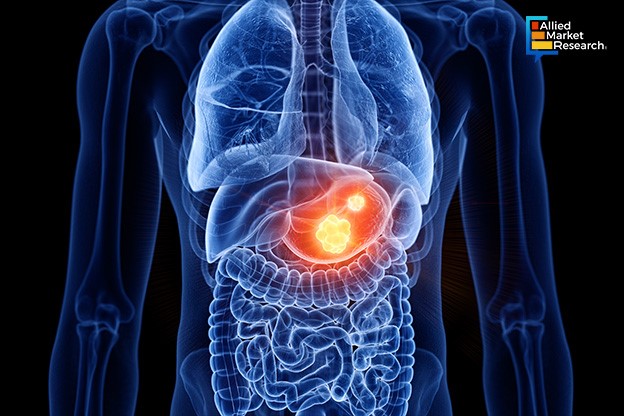How Has AI Brought a Revolutionary Approach in Gastric Cancer Diagnosis?

13 May
2024
Key Takeaways:
- Introduction
- AI in Gastric Cancer Diagnosis
- Leading regions and countries in the domain
- Some key innovations by prominent players
Nowadays, gastric cancer has become the most common cancer type across the globe. The diagnosis of gastric cancer involves medical history assessment, physical examination, and other tests. Endoscopy is one of the powerful tools for detection and diagnosis of this type of cancer. However, the accuracy of detection depends on the experience of the endoscopists. Over the years, advanced endoscopic techniques such as image-enhanced endoscopy have been developed to improve the detection of gastric cancer. Other promising methods like biopsy, imaging techniques such as CT scan, MRI, and PET scan are also done to check signs and symptoms associated with gastric cancer.
Role of Artificial Intelligence in early gastric cancer diagnosis
Recently, artificial intelligence has caught considerable attention in various medical fields. In gastroenterology, AI-based applications in capsule endoscopy and in the detection, localization, and segmentation of colonic polyps have gained huge popularity. Artificial intelligence is widely applicable assisting the decision of biopsy and endoscopic submucosal dissection (ESD) evaluation. Among various types of AI models, convolutional neural network (CNN) has become the highly demanding method in medical imaging.
AI algorithms have the potential to learn features from the data. This makes CNN think the same as a human brain by using huge datasets of images to learn certain patterns. Now, CNN has become ideal for endoscopic image recognition to detect and localize GI neoplasms. CNN has the potential to correctly identify previously unseen neoplasms. With recent developments, it is expected that CNN would be widely used for the detection of gastric neoplasm in a real-time endoscopic video input and prediction of invasion depth, promoting the diagnosis of EGC (early gastric cancer).
Prominent regions and countries leading ahead in bringing key advances in this field
The global gastric cancer diagnostic industry is examined across different regions and nations. The North America region attained the highest market share in 2022. This is mainly due to the increasing incident rates of gastric cancer and the presence of robust healthcare infrastructure across the region. Moreover, the growing focus on precision medicine and screening programs is expected to drive the regional growth of the domain in the coming years.
However, based on country, China is expected to manifest the highest CAGR of 7.30% from 2023 to 2032. While the UK is expected to hold the second rank in terms of growth, with a CAGR of 7.00% during the forecast period.
Groundbreaking innovations bringing new possibilities in the domain
The industry is witnessing significant growth due to the surge in demand for advanced gastric cancer diagnostic tools for the early detection of gastric cancer. Along with this, many leading players in the domain have continuously worked on developing effective tools to promote accurate and easy diagnosis of gastric cancer, fueling the industry’s growth. For instance, in March 2024, Astellas Pharma Inc., a Japanese multinational pharmaceutical company announced that Japan’s Ministry of Health, Labour and Welfare (MHLW), approved VYLOY™, an anti-claudin 18.2 (CLDN18.2) monoclonal antibody for patients with CLDN18.2 positive, unresectable, advanced or recurrent gastric cancer. VYLOY is the first and only CLDN18.2-targeted therapy approved by any regulatory agency in the world.
This approval of VYLOY by the MHLW marks a new era in the treatment of gastric cancer, offering the first and only targeted therapy option for CLDN18.2-positive patients living with this devastating disease. Astellas is proud to help address the urgent therapeutic need for this hard-to-treat cancer in Japan where incidence rates are among the highest globally.
Similarly, in November 2023, research carried out by a team from Nagoya University Graduate School of Medicine, the oldest Japanese medical schools for higher learning discovered a new reliable tumor marker, namely, stromal cell-derived factor 4 (SDF-4) protein, for detecting early stages of gastric cancer. During the research, the team investigated proteins secreted by cancer cells and identified SDF-4 as a successful candidate. While measuring the concentration of SDF-4 in blood samples from cancer patients and healthy individuals, they found elevated levels of the protein in cancer samples from many types of cancer including gastric.
To wrap up, the surge in prevalence of gastric cancers among individuals across the globe is expected to increase the demand for cutting-edge diagnostic tools and services in the future. Furthermore, continuous technological advancements such as molecular testing, improved endoscopy, and imaging techniques to enhance the accuracy and efficiency of gastric cancer diagnosis is predicted to foster the growth of the domain in the coming years.
To identify more opportunities in the gastric cancer diagnostic industry, feel free to talk to our industry analysts today! They can also help you develop new business strategies and attract new investors.

Rosy Behera
Author's Bio- Rosy Behera holds a bachelor’s degree in Electrical and Electronics Engineering and now she is a content writer by profession. She loves to portray her thoughts and ideas with a nice command of words. Grabbing an audience with her creative write-ups is one of her biggest assets so far. Apart from writing, she is a certified “Odisi” dancer and has done Gardharva in Drawing, Painting, and Arts. She always explores new things through travel and is a big foodie.
Avenue: Entire Library membership of Allied Market Research Reports at your disposal
- Avenue is an innovative subscription-based online report database.
- Avail an online access to the entire library of syndicated reports on more than 2,000 niche industries and company profiles on more than 12,000 firms across 11 domains.
- A cost-effective model tailored for entrepreneurs, investors, and students & researchers at universities.
- Request customizations, suggest new reports, and avail analyst support as per your requirements.
- Get an access to the library of reports at any time from any device and anywhere.
Related Post
-
How are Submarine Cables Transforming Global Connectivity with Enhanced User Experience?
-
Endoscopy Procedures: Transformations in Techniques and Applications
-
AI-Powered Video Analytics: How the Product Actually Works for enterprises
-
Painting Robots: Transforming Precision Coating and Creative Applications
-
Innovations in Pharmacovigilance Systems Advancing Patient Safety
-
Understanding Edge Security: Keeping Data Safe Near the Source
-
Exploring the Use and Advancements of 3D Laser Scanners in Professional Applications
-
Reinforcing Industrial Controls with Smarter Tools and Training








